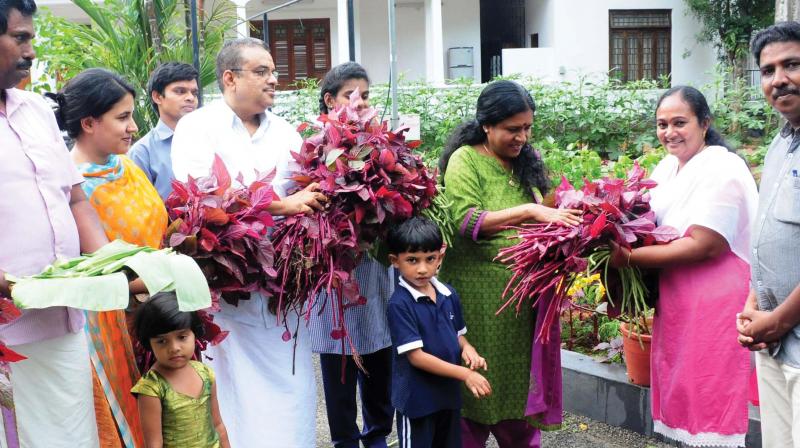God's own organic brand soon

Thiruvanananthapuram: As part of Good Agricultural Practices (GAP), agriculture development and farmer’s welfare department has come out with the brand 'Kerala Organic' so that everyone eats organic food. Though the department officials are hoping to procure as many organic vegetables as they can, they know it is difficult to sustain through the worst drought season. Kerala Agriculture University officials also say self-sustainability in organic farming is the only way to prevent the pesticide-laced vegetables coming from neighbouring states.
As per the Economic Review 2015, the per capita consumption of vegetables in Kerala is 160 g per day, the annual consumption being 20.78 lakh tonnes. However, the state has been producing much less than the requirement resulting in heavy dependence on neighbouring states. The government initiated a Vegetable Development Project (VDP) to augment vegetable production. As a result, it has increased to 13.55 lakh MT in 2014-15. The area under cultivation has also increased from 42,477 ha in 2011-12 to 90,533 ha in 2014-15, the share contributed by VDP being 36 percent.
But fortunately there has been a remarkable change among the consumers after the Pesticide Residue Research and Analytical Laboratory (PRRAL) attached to College of Agriculture, Vellayani, and state food safety department came up with the data of the alarming level of pesticide content. “Over the last four years' comparison chart, the level of pesticides has come down to eight percent from 18 percent,” said Prof Thomas Biju Mathew, head of the PRRAL lab. “Farmers themselves directly maintain a majority of the eco shops belonging to the state agriculture department. They bring the fruit and vegetable samples to the PRRAL lab, and I am happy to say that all are genuine organic products.”
If any farmer or consumer wishes to have the organic vegetables tested at the PRRAL lab, they can send it by courier on a non-woven fabric cover, after intimating the scientists on the phone (0471/2380520). The good news is that one can have it tested free of cost and they will send the report to them within seven days to ensure it’s 'safe to eat'. But what is more worrying among the agriculture officers is that under the ‘Kerala Organic’ brand, large-scale farming is impossible with the government banning red and yellow labelled fungicides and pesticides. They are apprehensive as the yields from produce have gone down.
“In 100 gm urea, there is 46 gm nitrogen available. But if you take 100 gm cow dung, there is only less than two percent nitrogen in it. There is a contradiction as to how to sustain the organic farming as with less area making it possible to increase the production,” said an agriculture officer. Aroma Fresh group which had produced 750 tonnes of organic vegetables last year could get only 60 percent of them from their farms at Gundlupet in Karnataka and Kalluvathukkal in Kollam district and had to tie up with private farmer groups to meet the demand. Anne Sajeev, managing director of the Global GAP-certified firm, told DC that her four outlets in Thiruvananthapuram and Kochi procure organic vegetables as per demand.
“The importance of the message is that ‘what you eat is what you will produce’. The dire need is that people should be aware of having safe-to-eat vegetables. Fortunately, the biggest advantage is that more people are getting enlightened about organic farming,” she said. Long years of hardships are required for a systematic organic farming to evolve, says P. H. Meherban, deputy director of agriculture. Two state level awards of Rs 3 lakh have gone to the Mananthavadi assembly constituency. The best organic farming award went to Sulthan Bathery municipality. She recalls that organic farming was started in the region as early as 1999 with farmers who were settlers relied on chemical fertilisers to produce black pepper and other spices.
“During the last three years, we intensified the organic cultivation of fruits and vegetables. Once the farmers register under the GAP scheme, we provide them with a diary where all the specifications right from soil to harvest would be included,” said Ms Meherban. She is elated and is keen to utilise the prize money for tribal communities in the region to market their traditional organic farming practices in rice cultivation. Agriculture minister V. S. Sunil Kumar told DC that only those vegetables that are traditionally grown in the state would come under ‘Kerala Organic’. “So far 416 clusters have been formed across the state," he said.
"We have trained farmers for a year now on how to use organic manure and to take care of it under the ‘Kerala Organic’ brand. Our consumers do not come to 65 eco shops in the state to buy potatoes, small and big onions, carrot, cauliflower and cabbage that are not grown here.” If it were Horticorp which directly bought winter vegetables from Vattavada and Kanthalloor in Idukki district until now, hereafter the clusters would procure them giving certification to the farmers. Agriculture department officials are on a mission to start 1,086 Vishukani shops in time for the festive season. Ahead of it ‘Kerala Organic’ vegetables would be distributed across the state.

